Glory to Ukraine, glory to Russia, glory to ALL the heroes
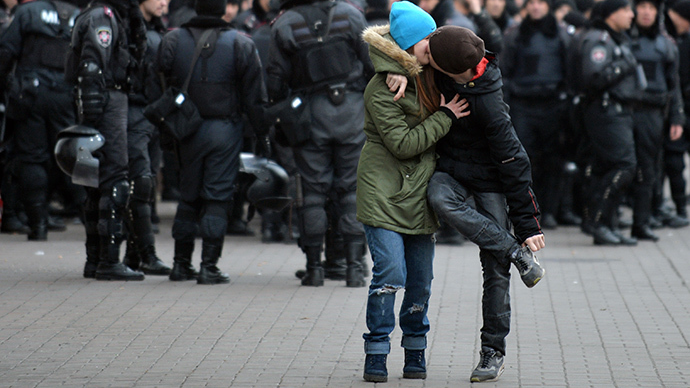
Well, my friends, another one of my hellish trips to my beloved Ukraine is over, and it’s time to draw breath and sum it up. Right after this, I probably won’t go back to this nightmare of a topic for a very long while.
I’ll say right away that it’s going to be a long piece, and just like last time, these are just my observations and impressions; there has never been and never will be any external influence on my opinion. I fully realize that some will agree with me and some won’t, but this is how I, a person for whom Ukraine isn’t just another assignment, saw and felt everything happening in Kiev and in the country.
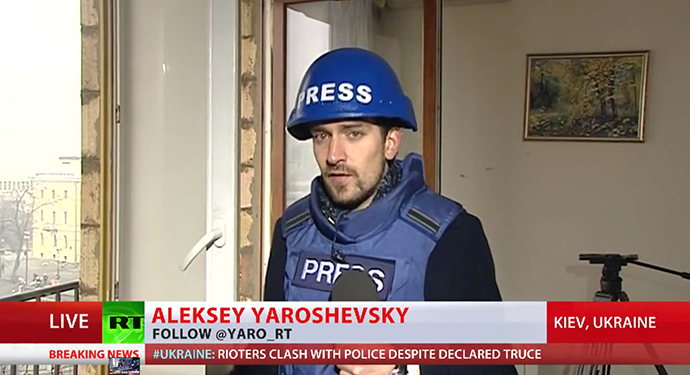
So I want to ask you not to take offense, since everyone is so sensitive about this subject right now. I’m not trying to impose my opinion or take sides. These are, again, just my observations. As they say, FYI.
I’ll start with the previously undisclosed details of the “Black Thursday” of February 20, when so much blood was spilled on the streets of Kiev (you have already doubtless seen my video from the battleground).
I was leaving Maidan on Wednesday night at about 1am (that is, the side of the barricades where the police were; for the first time in one and a half months, we got there almost without any obstacles), and both the police and Berkut tried to tell me in various ways to be careful on my way from the Ukraine Hotel to the Dnipro Hotel. I was genuinely confused, and they told me, “There’s gunfire from Maidan.” It was just over an hour since the “truce” between the opposition and the president had been declared.
The “truce” was questionable even then, even without the police talking about gunfire. We were reporting near the “frontlines” opposite the Khreschatyk Hotel when someone threw several Molotov cocktails from the windows of the almost completely burnt-out Trade Unions Building. We could hear petards and stun grenades going off and see bottles and stones flying from Maidan. “Truce”? No damn way, I thought. I was scheduled to go live from the parking lot near the Ukraine Hotel at 9am. I woke up at 8am, and, catching up on the news while brushing my teeth, saw that the situation seemed to be calm. So I relaxed.
How wrong I was!
A gloomy traffic police officer stopped our car on the corner of Lipska and Institutska St. and said, “I won’t let you drive any further, they’ll burn your car.” “What do you mean?” I asked. “There’s a truce.” With a smirk, the officer pointed at a burnt carcass of a car flipped over on the sidewalk. “A truce? They burnt this car during the night, and there’s another one over there. Walk on, but at your own risk.”
I started walking, of course, because what risk could there be? 150m ahead, just past the corner with Bankova St, there was a Berkut cordon. It was Berkut, not the police or the internal troops. The commanding officer refused to let me through for a long time, harping on that phrase again, “There’s gunfire.” Neither my press card, nor promises to go only as far as the Ukraine Hotel building helped convince him. What swayed him was the guest pass of a hotel resident that I had borrowed from my colleagues the day before.
Mayhem in Maidan
When they finally let me through, the first thing I saw was a Berkut soldier on a stretcher, covered in blood, his face ruined and his arm barely attached to his body. Yes, that’s exactly what I mean – his arm was almost completely blown off. I still want to know what happened to him, whether he survived or not, because his wounds were very serious. I didn’t have time to consider what could possibly have caused this much damage to a soldier wearing a bulletproof vest and a helmet, and off I went for my broadcast. Several minutes before I had to go on air, I was standing in front of the camera and my connection with Moscow was ready. Then all hell broke loose about 50 meters behind me.
I really want to find the recording of that live broadcast and post it here. I was live on air, talking about (and showing) the gunfire, obviously live ammo, and Maidan protesters launching an attack. In the middle of my reporting a group of protesters started running my way. There was no time to think about their intentions, and I don’t believe they meant me any harm – they were probably just going for the hotel’s entrance – but I noticed a grenade flying out of the bushes in my peripheral vision. I needed to get off the air instantly and hide. The stun grenade went off next to the parking lot right in front of the entrance, that is, about 15 meters from where I was. You know what happened next, and not only from me – our ill-fated live broadcast when we were shot at by a police sniper, unarmed protesters killed, and the president running away.
In a separate paragraph, I would like to express my deepest gratitude to Andrey Levin and Anton Borodavka, friends that took risks and saved us from starving to death and losing our minds in that heated situation. Guys, I appreciate that so much.
I told you all this so that no one harbors any delusions: there are no saints in this war (not to be confused with Russia’s actions in the Crimea that everyone refers to as “war” – I am talking about the conflict within Ukrainian society that I voiced MY OWN opinion on earlier). A week after these events, I was invited to BBC World radio and described what happened to Andriy Shevchenko, a member of the oppositional Batkivshchyna party. He replied, “Yes, I knew WE (he meant the Maidan activists, of course) had a lot of ammo, but we never considered actually using it. It’s a fact that the first bullet was fired from the Maidan side, and it surprised me immensely. I still don’t understand who gave the order or sent those people in without shields to die.” As a former journalist, he was shocked to hear about us almost getting “shot by the police by accident.”
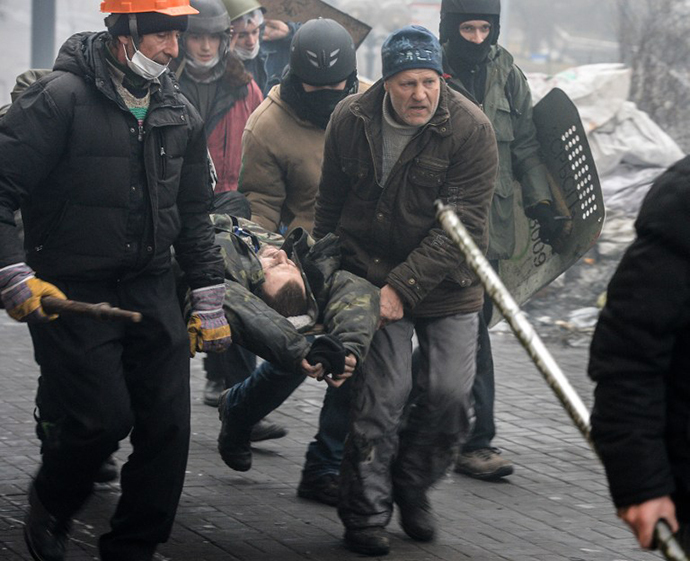
I’m convinced that we’ll never know the whole truth behind the events in Kiev, and people will come up with a variety of opinions and assessments. Of course, it’s important that all the murderers are found and punished – those who fired at the guys with shields, those who ordered it and those who killed policemen both in Maidan and outside it. Although, in the latter case, I very much doubt that it will ever happen, despite (sorry for the pathos) the fact that every human life is priceless and those who take it away must be punished. But more importantly, neither Ukraine, nor we, who took part in these events and saw them with our own eyes, will ever be the same after all this bloodshed and terror.
A lot of things about Maidan, both in the form of standing protests and what happened on Grushevskogo/Institutska St, were right and a lot were wrong. Soon after the protests began, I wrote that all the reasonable skepticism towards Kiev’s EU integration initiative notwithstanding, I wholeheartedly support the people’s desire to live in a country where the rule of law actually works, and the authorities can’t just do whatever they want. The Maidan protesters were so united and sincere, it kept amazing me throughout my sojourn.
But, for me, some lowlifes (regardless of whether they were local or not), seizing city administration buildings is just as bad and disgusting as a murderer and a bastard harassing officials in front of cameras. The fate of the country I love with all my heart will probably be determined by the country itself. There probably will be more turbulence, and the people will have to rise up again and again to fight against abuse of power. I think many people will agree that the new government has minimum credibility, a fact they have been proving since they came to power. But the Ukrainian people have to do it on their own.
Since the first days of the active phase of the conflict in Kiev, it was clear to me that it’s not about fed-up people fighting their Ukrainephobic/thieving/idiotic president; it’s just a stage for a much more serious geopolitical struggle. Don’t kid yourselves! Ukraine was always going to become that stage, based on its location and history. But I really hope that in the future both Russia and the EU leave Ukraine alone and stop fighting over it like it was a coveted prize. Instead, they should find a way to help the nation along the right path. Before you condemn me as an “occupation” advocate, please read the next paragraph.
I will not presume to judge whether the Russian government and President Putin’s actions have been legitimate. I know the audience is split in opinion on this: some wholeheartedly support the current developments in Crimea, others see Putin and the Russians as “fascists” and “invaders,” while some are trying to stay calm and remain neutral. I would say there has certainly been some overreaction on Russia’s part – but in this turmoil, pretty much every party has overreacted. Yet there is one thing I am confident about: there is no war going on between Russia and Ukraine – in the sense that there is no fighting and no KIAs – and there won’t be. Russian servicemen will not fire on Ukrainians, and vice versa.
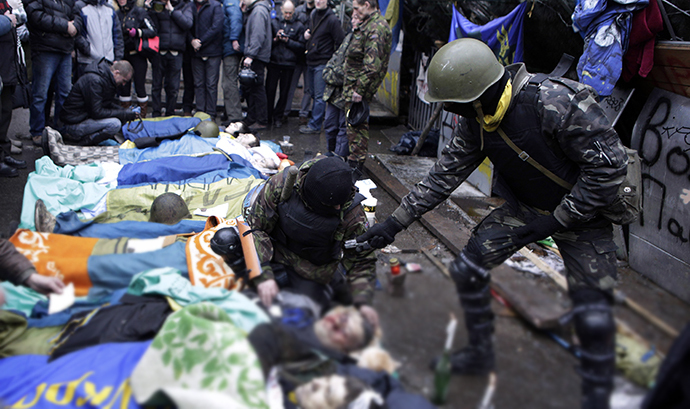
Mayhem in the media
However, there is a different kind of war going on: a media war. It’s been raging for some time already, and it’s at its height now. There have been lots of lies and trumped-up fabrications peddled on either side, complete with deliberate attempts at spreading panic among ordinary civilians. Once the dust has settled, I hope that every one of the news people who had a hand in fear mongering will hang their heads in shame. But for the time being, this is what upsets me most.
With people pointing fingers and labeling whoever they disagree with, it is incredibly difficult to explain to them how we did our best from day one to cover the Ukrainian crisis as it was, steering clear from an aggressive stance as well as from too much drama. I can assure you that in the three months that I was covering the Maidan events, NO ONE ever instructed me on what I should say.
Some were reluctant to believe that. A characteristic interaction took place in the lobby of the Ukraine hotel, where a Maidan activist (a Russian national, by the way) confronted me in public, bringing along a Maidan field surgeon, whom I had interviewed the previous day. With a voice recorder rolling, the activist accused me of rigging the interview to make it sound as though the surgeon had actually conceded that Maidan protesters were deliberately targeting their own medics with firearms. (In reality, the surgeon, Yevgeny, had told me the number of wounded was enormous, and that the police were shooting people and aiming for the head.) I had to show the two of them my script and the sound bites picked for my story, before the activist acknowledged he had made a mistake.
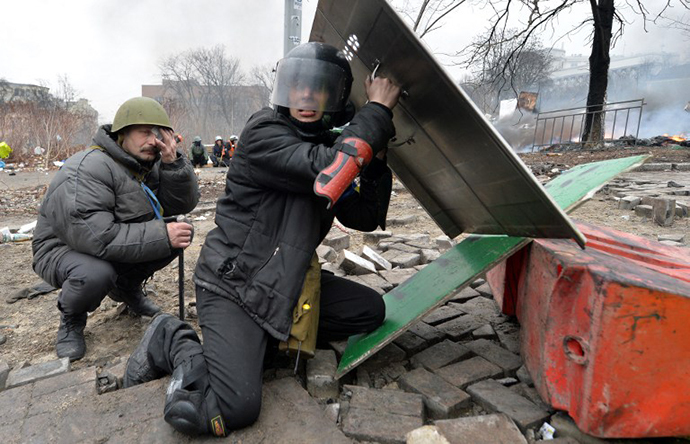
We parted amicably enough, going as far as cracking jokes and exchanging opinions on what the future might hold for us all. Yet this incident left a lingering aftertaste, and here is why: I realized the tags had already been attached, and spiteful propaganda was in full swing. The power game between Russia and the West will inevitably run its course someday, but the seeds of hatred and bigotry sown between large masses of people in Russia and Ukraine by way of blatant propaganda and deliberate lies will contaminate the relations between our two countries for decades to come.
The popular narrative in Russia is that Ukraine has been taken over by a fascist junta. Ukrainians, in turn, believe that Russia hates them and seeks to annex their eastern regions. The situation is evolving so rapidly that it makes any prediction futile. I would probably suggest that Eastern Ukraine might remain restless for some time, until the new policy makers in Kiev finally learn to compromise with their own countrymen. But I would like to caution everyone from falling for the “war” talk and turning it into a self-fulfilling prophecy. There is no need to store canned foods and oil your Kalashnikov. And there is little validity in obsessing over the 2008 war in South Ossetia, citing it as proof that Russia is prone to waging war on its neighbors. There will be no war between Russia and Ukraine, period.
I call on every sane, rational individual to refrain from fomenting hatred between our two nations. This might sound awfully dramatic, but we are neighbors, friends, and brothers.
And one last thing: I guess it is no secret that I consider Ukraine my second home. My Grandfather had “Ukrainian” written in his passport. I lived and worked in Ukraine for many years, and my son was conceived in Kiev. As I’m taking my leave of Kiev now, I shiver at the thought that I was nearly killed in the warm and homely city that I love so much. Even if I spend the rest of my life away from Ukraine, my heart will always go out to this beautiful country. And even though I’m leaving it with a bleeding heart, I’m still hopeful that I will have reason to rejoice for Ukraine soon enough.
Glory to Ukraine, glory to Russia, glory to ALL the heroes.
Alexey Yaroshevsky, RT
The statements, views and opinions expressed in this column are solely those of the author and do not necessarily represent those of RT.












